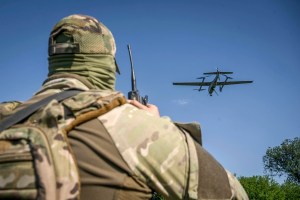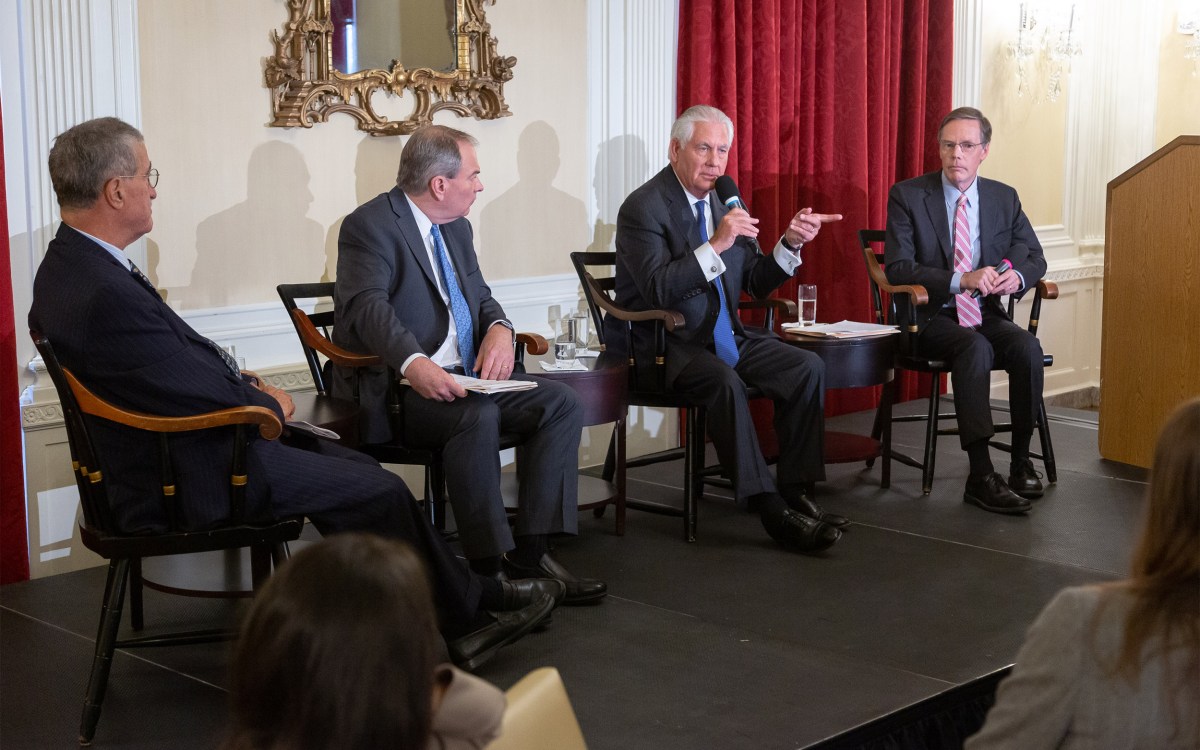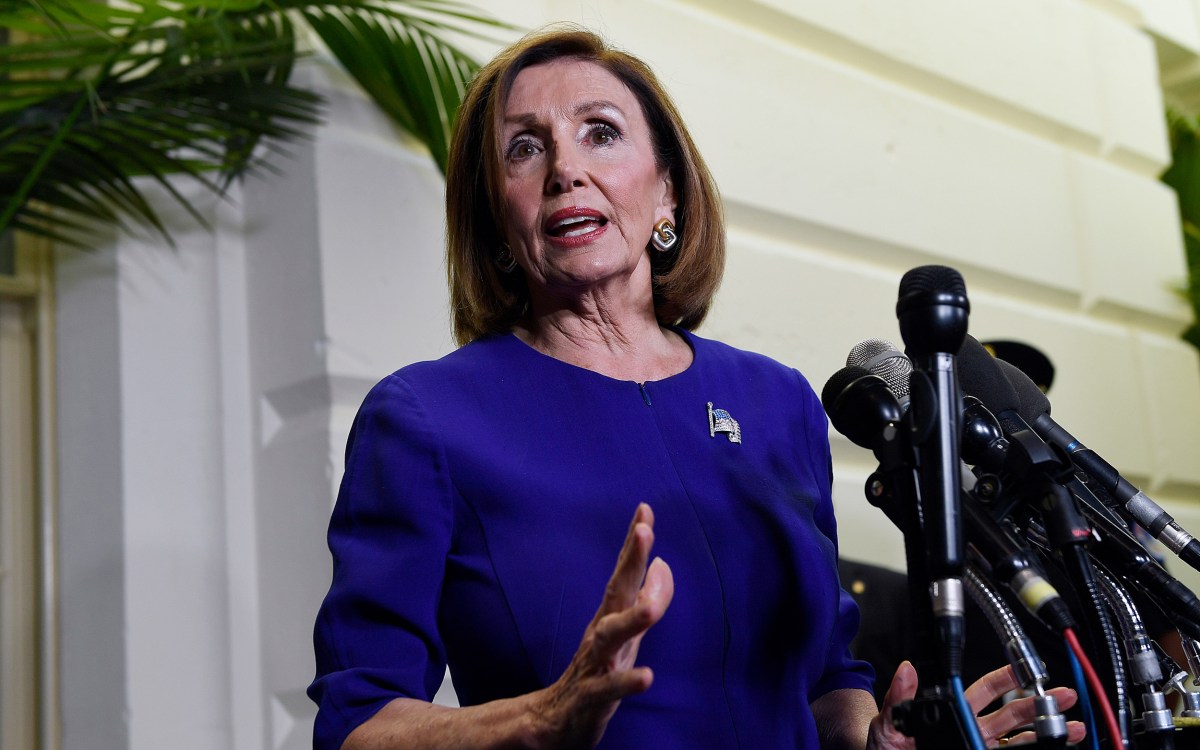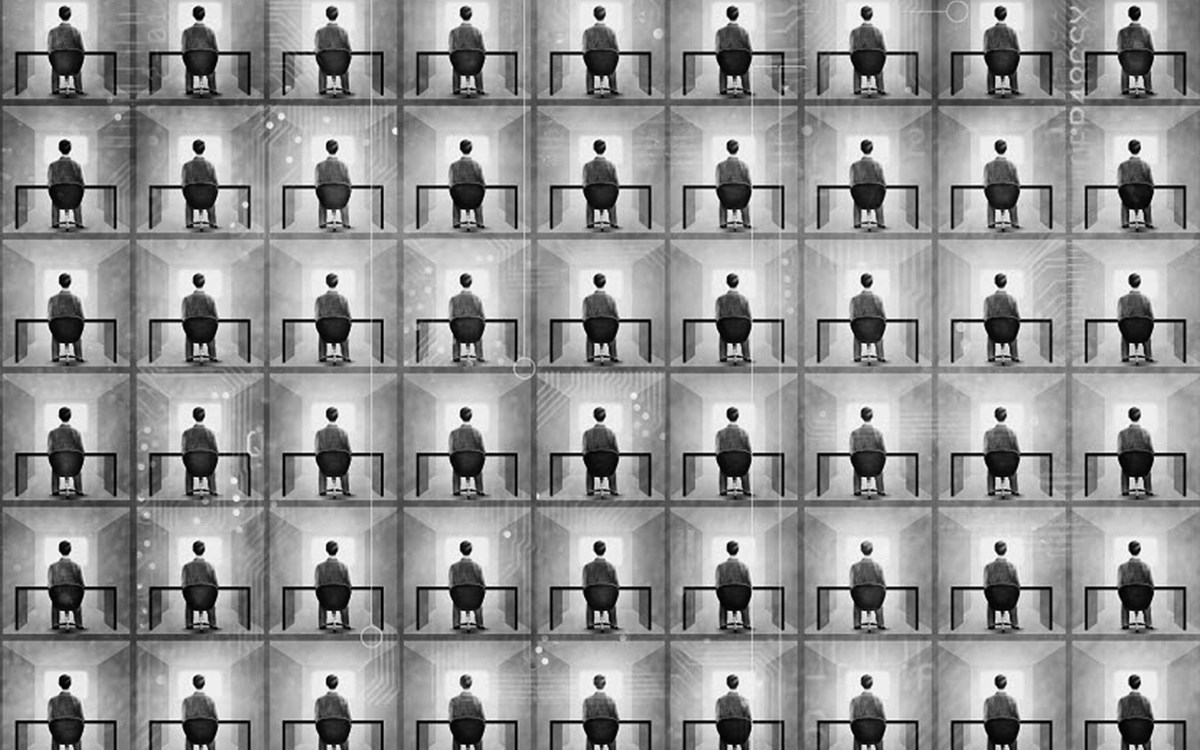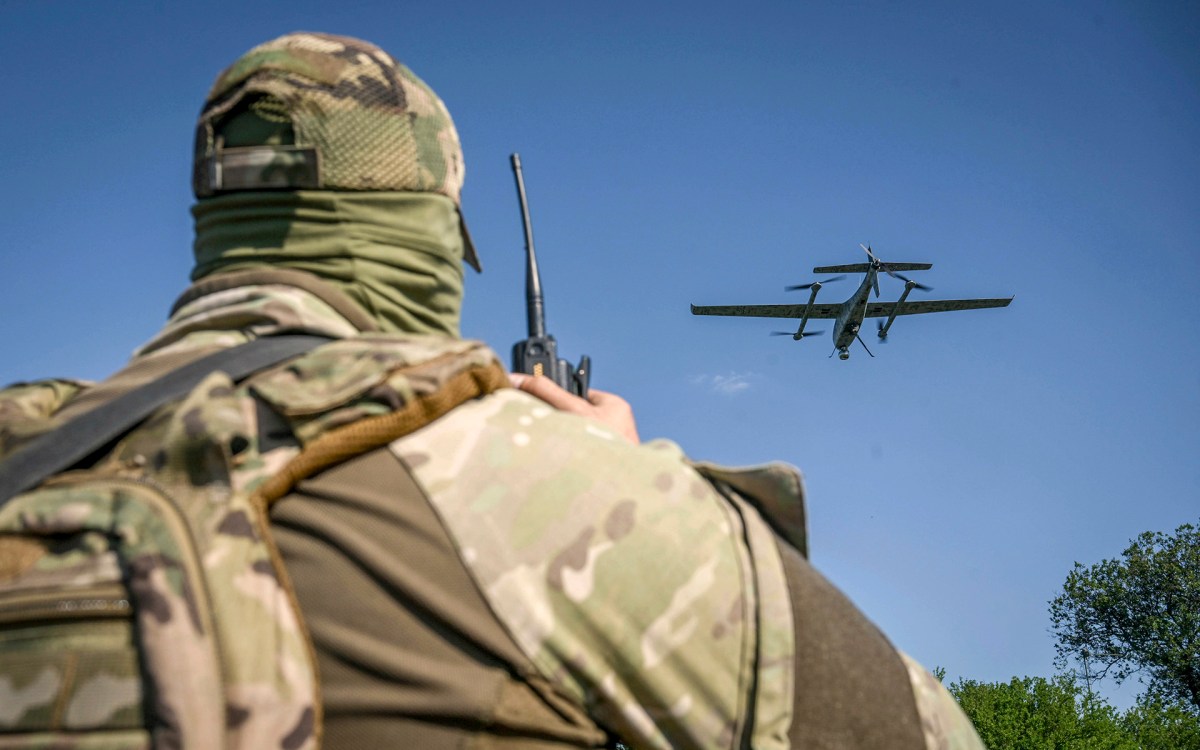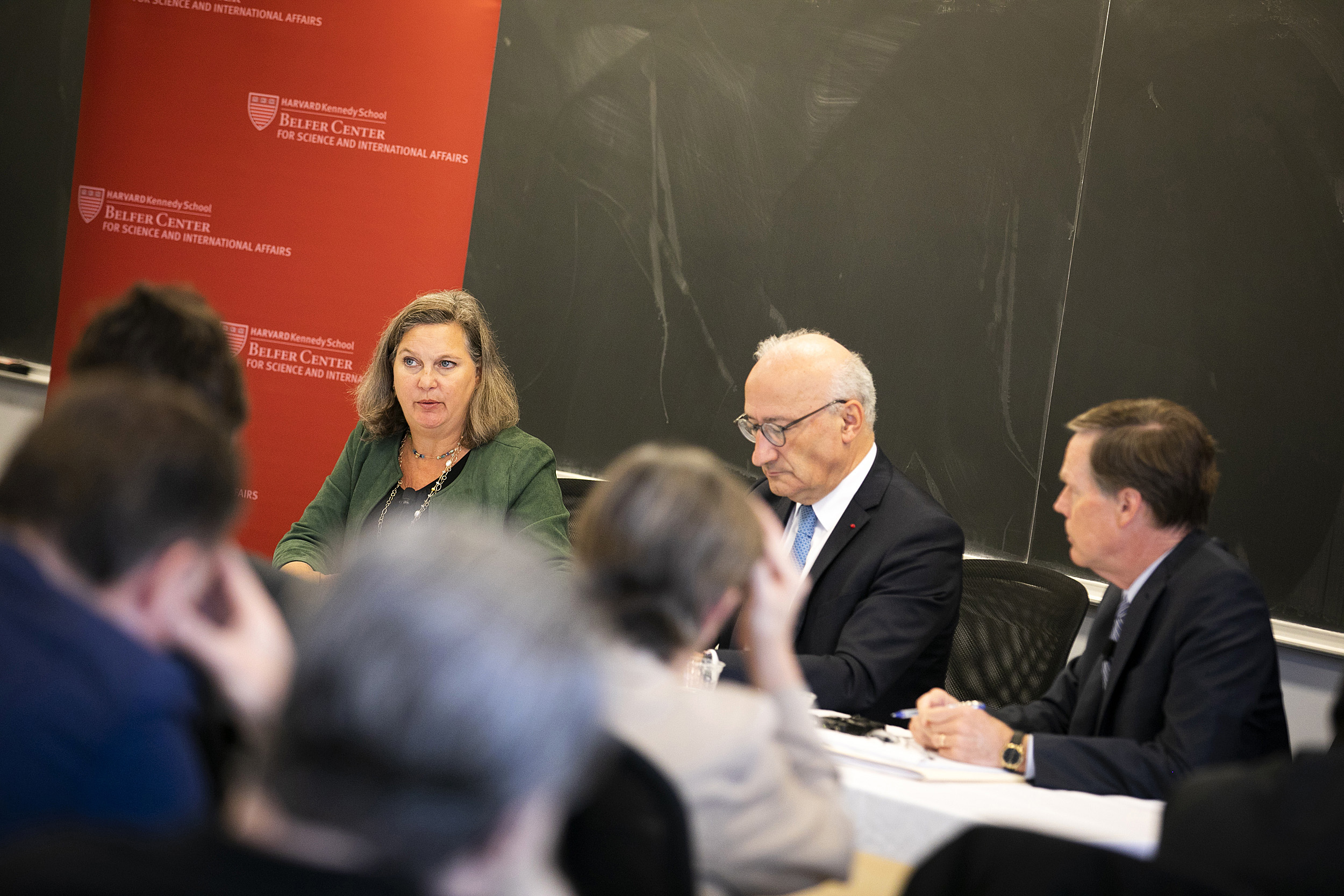
Former Ambassador Victoria Nuland (from left), now a Senior Fellow at Harvard Kennedy School, spoke earlier this week with Philippe Étienne, ambassador of France in the United States, and Harvard’s Nicholas Burns.
Stephanie Mitchell/Harvard Staff Photographer
American foreign policy in flux
Former career Ambassador Victoria Nuland unwinds the tangle of issues around Russia, Ukraine, and Syria
Swirling questions about the chaos in Syria, the fears of Russian leader Vladimir Putin, and why Ukraine is so essential to Russia and the West are suddenly center stage in American political life. They’re complicated issues about which most Americans know very little. But for Victoria Nuland, a senior fellow in the Future of Diplomacy Project at Harvard Kennedy School, they are at the heart of her life’s work. A career ambassador, Nuland spent more than three decades in the U.S. Foreign Service as a top Russian policy expert and representative to NATO, Ukraine, and Europe during the administrations of George W. Bush and Barack Obama. Nuland’s leadership of U.S. support for the Maidan revolution in Ukraine made her the first high-profile victim of politically targeted phone hackings ordered by Putin in 2014. She was also part of an international coalition that included then-Vice President Joe Biden that pressed the post-Maidan Ukrainian government to root out corruption and make reforms. Nuland, who spoke at Harvard about the trans-Atlantic alliance earlier this week, sat down with the Gazette to talk about a range of hot foreign policy issues, though she declined to discuss the Trump administration and Ukrainian President Volodymyr Zelensky because of the ongoing congressional inquiry.
Q&A
Victoria Nuland
GAZETTE: What’s your view of the situation in northern Syria right now after the president, saying our presence was no longer necessary, abruptly announced the withdrawal of U.S. troops this month?
NULAND: The U.S. does have a strategic interest in how things turn out in Syria, and that’s why we were so involved in ’13, ’14, ’15, ’16, and so on. And it’s not simply, although very importantly, that we went in with our own forces to defeat ISIS on the ground and we need to ensure that it can’t resurge in any way, shape, or form. But it is also so that no other great power, whether Russia or Iran, which is now effectively forming a police force on the ground in towns and villages across Syria for [President Bashar al-]Assad because he can’t maintain public control without them, gains greater influence and ability to extend their geostrategic reach in Syria. I think we have neglected to explain to the American people that either Iran is going to have more control of Syria or Russia is going to have more control of Syria or both. And that means not only that the Syrian people are going to suffer and that the country is going to continue to bleed for a long, long time, but it means that our own ability to affect stability and security in the Middle East will be greatly reduced.
GAZETTE: What were some of the knock-on effects of President Trump greenlighting Turkish President Recep Tayyip Erdoğan’s incursion into Kurdish territory in Northern Syria? Are we looking at a regional realignment or is it too soon to say?
NULAND: Well, the strategic tragedy of it was that when Trump made his decision, we were in the middle of a very intense negotiation with Turkey about how it could establish a buffer zone to protect its own territory without the U.S. having to leave and in a manner that would ensure that neither the Russians nor Assad nor ISIS regain that territory. And we were about halfway through those discussions. They were difficult, because those are the Kurdish homelands. And there was a question of whether Turkey and the Kurds could coexist if the U.S. was present as an honest broker. And rather than completing that in a way that would be stabilizing for Syria, that would end bloodshed rather than accelerate it and that would keep ISIS bottled up, when Erdogan said, “No, I got this,” Trump said, “Sure,” and we pulled out.
I think all of it is dangerous. I think the Turkish ambitions are greater than the Kurds are going to tolerate. They want to recontrol those northern towns, and those are the homelands of these folks who helped us beat ISIS. I don’t think anybody has the capacity to keep ISIS bottled up if we are not present. And now you see the Russians volunteering to be an interpositional force, which just enhances their influence. You already see them talking to the Turks about selling them even more weapons systems. But it also takes the Russian ground reach deeper into the east of Syria, which is why the president has recalibrated now to keep some troops around the oil fields. If Russia and Assad and Iran get control of those oil fields, they’ll be able to finance all of this, and the benefit of that will not go to the Syrian people. It’ll go right into the pockets of the Kremlin and the ayatollahs and the Assad family.
GAZETTE: How significant will the death of ISIS leader Abu Bakr al-Baghdadi be in the fight against ISIS?
NULAND: I think one of the most important things to remember is we would not have been able to achieve that without intelligence cooperation with both the Kurds and the Iraqis, which we built and nurtured and grew as a result of working together on security problems that they had, and working together against ISIS. So what happens when we withdraw from these relationships and when we’re less reliable? They have to find their own solutions, which might include accommodating ISIS or al-Qaida or whatever. So, are we going to be able to do the next one? It was obviously important to take al-Baghdadi off the battlefield. I thought we could have done it with more grace of discretion. I don’t think bragging about the details was seemly or necessary.
GAZETTE: How damaging is U.S. abandonment of the Kurds to our standing in the world?
NULAND: When you are an unreliable ally, then countries and leaders around the world who have bet their security by being on your team have to start hedging their bets and developing multiple relationships. And that just leads to the acceleration of the atrophying of American power and influence. So, you’re going to feel it. We’ve already felt it vis-à-vis our ability to influence Turkey’s behavior; we’re certainly going to feel it now in Iraq. Israel has been hedging for quite some time in terms of its relationship with Iran. And you see it in other aspects of U.S. foreign policy. Why should the Germans listen to us when we say, “Don’t deepen your economic and information relationship with China?” Are we offering any alternative to our way to them? No, we’re just telling them what not to do. We’re not working together on what to do. And so, they are hedging their bets vis-à-vis China, as well.
“I think we have neglected to explain to the American people that either Iran is going to have more control of Syria or Russia is going to have more control of Syria or both.”
GAZETTE: Putin famously hacked your phone in 2014 during a call with the U.S. ambassador to Ukraine and put out a somewhat salty transcript, hoping to embarrass you. People now look back at that incident as a sort of harbinger of what would come in 2016 with the election interference. First, do you think there is a connection and why do you think Putin had you hacked?
NULAND: [New York Times reporter] David Sanger called me Patient Zero in the Russian hack-and-release strategy, and I think that’s right. When I had that phone call where we were trying to get [former Ukrainian President Viktor] Yanukovych and the opposition to work together on a technical government, I obviously knew it was an open phone line. We were being transparent to the Russians about what we were doing, and the Russians had not publicly released a phone call in some 25 years. It was the beginning of a certain kind of hardball that they were playing with nonmilitary means, if you will. I had been the main interlocutor on the ground, trying to de-escalate the Maidan conflict so that the Ukrainians could find a way back to association with Europe, and obviously Russia was trying to stop that. So if they could take me off the boards by discrediting me with either the Ukrainian opposition, the Europeans, or my own government, then that would be a good win for them. But interestingly, they just ended up raising my profile and strengthening me in the conversation.
GAZETTE: You were one of the people in the Obama administration to sound the alarm pretty early on about Russia’s 2016 hacking efforts. If you could go back and quarterback things, what would you recommend the U.S. do to thwart Putin?
NULAND: I think the French actually had really good success in the context of [President Emmanuel] Macron’s election in deterring Putin by doing exactly what we had the option to do and didn’t do at the time, which was to go public with what they were up to, expose it, educate our news entities, educate our public. Because sunshine is the best disinfectant. It had the effect in France of virtually neutralizing any impact that the Russians were going to have. There were various things that we recommended in the middle of the campaign to be more overt about what we knew was happening, to put the evidence out, and to, how should we say, “treat the Russians in kind,” if you will — things that might have deterred them. But there were also concerns at leadership level that any activity like that would be twisted in the campaign as interference of our own in our election. And so the decision was made to wait and deal with the Russia problem after the election had happened. I think that nobody at that time anticipated that whomever was elected might choose not to pursue what the intelligence community had found out. So I think it was pretty obvious the tack that President Trump took to these things to make it about himself rather than U.S. national security. So we didn’t anticipate that we wouldn’t ever get the chance to come back to it.
GAZETTE: Why is Ukraine of such intense interest to Russia, to Europe, to the U.S., and now, we’ve come to learn, lobbyist-lawyers like Paul Manafort and Rudy Giuliani?
NULAND: Since 1991, when Ukraine declared its independence in the context of the Soviet Union breaking up, the Ukrainian people have tried three times to build a more democratic, more European state. And every time, that project has disintegrated either through lack of political will or through corrupt influence, including corrupting influence and money from Russia. So, this last time when Maidan happened, remember that the Ukrainian people took to the streets not because they were being denied EU membership; it was EU association. It was freedom to travel, to trade with Europe. And that was frankly too threatening for Putin to tolerate, so he made Yanukovych another offer: “Take $15 billion in loans from Russia instead.” We were always going to stand on the side of the Ukrainian people wanting their independence from Russia. I think Ukrainians at that time really thought that it shouldn’t be zero sum, that they ought to be able to have a strong relationship with Europe and a strong relationship with Russia. And in fact, there might have been advantages to Russia, since it also had free trade with Ukraine. They could’ve figured something out there, which we were trying to negotiate. When Putin decides to retaliate for that by first, biting off Crimea and then a piece of eastern Ukraine, he had violated international rules of the road since the end of World War II: You don’t change borders by force and get away with it. So that was about Ukraine, but it was also about international rules of the road and standards of behavior, and here we were thinking that we could also Europeanize Russia, but not if they’re not going to live by basic standards of good neighborly relations.
GAZETTE: Is it economics that he’s worried about in Ukraine, or is it further democratization and Westernization?
NULAND: A third of Ukraine speaks Russian; they have cultural and religious and historical roots in common, lots of intermarriage, families back and forth. If the Ukrainians could have a peaceful, democratic European state with a market economy and more opportunity to travel, then Russians would start demanding the same thing of Putin, and Putin wasn’t prepared to give that, so it was intrinsically existentially threatening for Putin.
GAZETTE: You served as spokesperson for the State Department under Secretary [Hillary] Clinton. For people who cover foreign affairs, it’s been jarring how both Secretary [Rex] Tillerson and now, Secretary [Mike] Pompeo seem to view the press as a nuisance and don’t value the spokesperson’s role. What role should the press play in the diplomacy ecosystem?
NULAND: It’s absolutely essential because without the press, the American public, the global public has no idea what you are doing in terms of your diplomatic pursuits: what you’re trying to achieve, how you’re doing it, who’s doing it with you, why it’s a better alternative than war or other options that you might have. If you know a tree falls in the forest and nobody hears it, what’s the point? It’s always been essential to successful diplomacy to bring the public along and frankly, to have that diplomacy stress-tested against public opinion. I think part of the problem that we have now is with bipartisanship — which always used to begin at the water’s edge, you never would see Republicans and Democrats criticizing the country once they left it. Part of the reason we don’t have that anymore is we’re not out there as a community trying to explain what we’re doing and why diplomacy is better and to bring political leaders along, bring the public along, bring the international community along. So it’s a real loss. It’s part of the great atrophying of America power that we’re not out there explaining ourselves and defending ourselves and trying to create community of common interest.
This interview has been edited for clarity and condensed for length.


